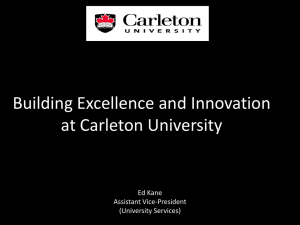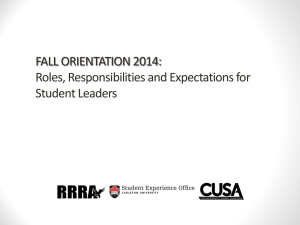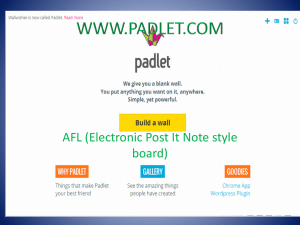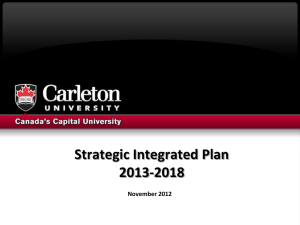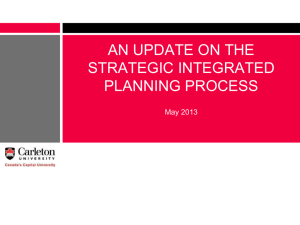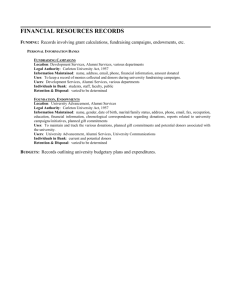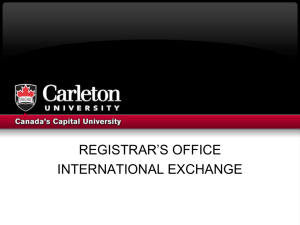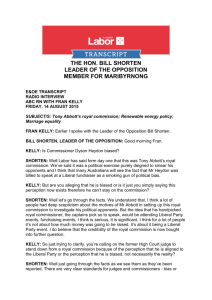Full Text - Canberra IQ
advertisement
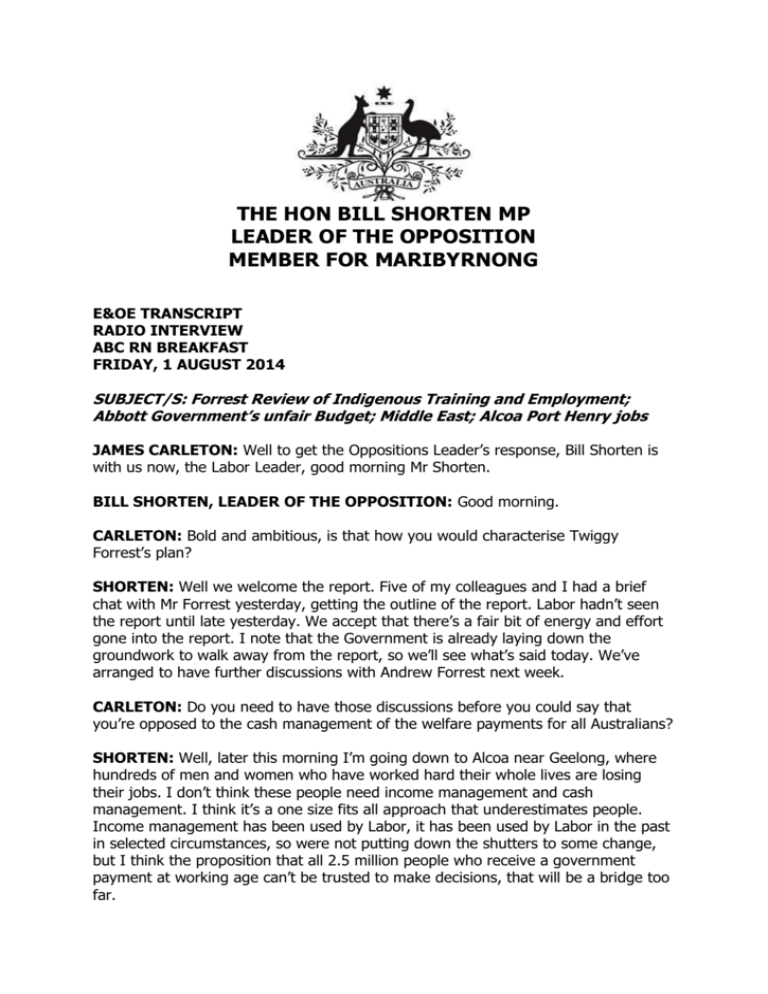
THE HON BILL SHORTEN MP LEADER OF THE OPPOSITION MEMBER FOR MARIBYRNONG E&OE TRANSCRIPT RADIO INTERVIEW ABC RN BREAKFAST FRIDAY, 1 AUGUST 2014 SUBJECT/S: Forrest Review of Indigenous Training and Employment; Abbott Government’s unfair Budget; Middle East; Alcoa Port Henry jobs JAMES CARLETON: Well to get the Oppositions Leader’s response, Bill Shorten is with us now, the Labor Leader, good morning Mr Shorten. BILL SHORTEN, LEADER OF THE OPPOSITION: Good morning. CARLETON: Bold and ambitious, is that how you would characterise Twiggy Forrest’s plan? SHORTEN: Well we welcome the report. Five of my colleagues and I had a brief chat with Mr Forrest yesterday, getting the outline of the report. Labor hadn’t seen the report until late yesterday. We accept that there’s a fair bit of energy and effort gone into the report. I note that the Government is already laying down the groundwork to walk away from the report, so we’ll see what’s said today. We’ve arranged to have further discussions with Andrew Forrest next week. CARLETON: Do you need to have those discussions before you could say that you’re opposed to the cash management of the welfare payments for all Australians? SHORTEN: Well, later this morning I’m going down to Alcoa near Geelong, where hundreds of men and women who have worked hard their whole lives are losing their jobs. I don’t think these people need income management and cash management. I think it’s a one size fits all approach that underestimates people. Income management has been used by Labor, it has been used by Labor in the past in selected circumstances, so were not putting down the shutters to some change, but I think the proposition that all 2.5 million people who receive a government payment at working age can’t be trusted to make decisions, that will be a bridge too far. CARLETON: What about the Budget? Joe Hockey told Breakfast earlier this week that Labor has reneged on its bipartisan support for a surplus, is that the case? SHORTEN: Joe Hockey’s looking around, flailing around, to blame anyone. I mean I think the spectacle of the Treasurer of Australia, 10 weeks after he brought down his budget trying to retrofit the votes to get it through, trying to explain to people why it’s a good idea 10 weeks later is a joke. I think everybody knows that Labor couldn’t in a month of Sundays support a GP tax, and we wouldn’t, that’s not who we are. We’re not going to support a debt sentence for kids going to universities, we don’t believe that the government should be rewarded for breaking its promise on a new petrol tax or cutting pensions or gutting school or hospital funding over the next decade. If Joe Hockey thinks that he can rhetorically blackmail Labor into giving in and surrendering our values and views because of his poorly constructed, unfair, rotten budget of broken promises built on lies, he is dreaming. CARLETON: What do you, when do you, as you look ahead, I mean we’re not going to have a surplus by the Government’s own admission within the next four years even if the Budget does pass. Looking at the structural imbalance that does exist, when do you think Australia will have a balanced budget? SHORTEN: Well, trying to balance the budget is always an important task in government, making sure that outlays and revenues are in sync. Making sure that we’ve got a sensible trajectory over the medium term, it’s very important – CARLETON: But it’s not sensible now is it? SHORTEN: Well, but it depends what policies you put forward. I think every Australian knows that only the Prime Minister’s supporting his gold plated, Rolls Royce, unfair paid parental leave scheme. He could save some money for the bottom line if he would just look in the mirror and say ‘you got it wrong’. In terms of some of their other ideas, we’ve proposed everyone paying their fair share of taxation, yet this Government’s scrapped tax compliance measures which would see multinationals pay their fair share of tax. So this is a government who is only looking to ask the bottom half of income earners in Australia to do the heavy lifting, and the very well off are on a busman’s holiday with this government. CARLETON: Those measures you mention of course would address some income, but in terms of structural changes, things that will, you know, fundamentally change the trajectory of Australia’s fiscal situation? SHORTEN: Well, two points. One is, Labor has always been prepared and up for the discussion for sensible means testing, and we’ve indicated that we will indeed support some of the Government’s propositions. So that’s the first part of the story, we’ve always been up for a discussion. I think the second unwritten, undiscussed part of the nature of Australia since Tony Abbott came to power is, he would rather talk to the Palmer United Party, he would rather talk to third parties than sit down and talk to the Labor Party about what’s in the best interest for this nation. See, Tony Abbott so dislikes the Labor Party, so addicted to the politics of opposition, that he doesn’t know how to negotiate with other people about what’s in the best interests of the nation. He talks about his mandate, well the rest of us got elected too. We’ve got a mandate too, doesn’t it bewilder people that we’ve got a government who when it comes to domestic politics just can’t sit down and talk to the Opposition about what’s important and sensible? CARLETON: I guess no more bewildering than Julia Gillard negotiating with the Greens and the Member for Windsor and the Member for Lyne. SHORTEN: Well, fair’s fair. First of all, Tony Abbott’s now the Prime Minster, so you know, if everything is, well something happened at an earlier date therefore that excuses Tony Abbott now – CARLETON: No, no you were saying it was bad Tony Abbott negotiates with the crossbench. SHORTEN: I don’t think it’s bad that he negotiates with the crossbenchers, I just say that there’s the Labor Party he can negotiate with too. CARLETON: And how did Julia Gillard’s negotiations go with Tony Abbott? SHORTEN: Well, first of all, Tony Abbott made it clear that he was never interested in negotiations. You never had Tony Abbott on your radio show like I am now – CARLETON: Believe me, we asked. SHORTEN: I’m sure you asked, look I’m not in the anti-ABC faction of Australian politics, I get that. But what I’m saying to you straight forward is that, listen I don’t think that the Liberals are going to agree with everything we say and we’re not going to agree with everything they say. But what has amazed me in the 10 months since I’ve been Opposition Leader is that Tony Abbott will do anything but deal with the Opposition. You see he thinks that somehow negotiating with Labor is a sign of weakness; I just think it’s a sign of pragmatism and getting on with business. I mean let’s have a look at the changes to financial advice. They’re going to bypass the Parliament to try and carry out some of their changes. I think we’ve got this crazy spectacle where you’ve got Joe Hockey huffing and puffing, saying ‘oh well, you know, I’ll bypass the parliament if I can’t get my Budget through.’ Well that doesn’t say very much for the Government’s trust in the Australian people to have scrutiny of their Budget. CARLETON: Do you think there should be a mini-budget? SHORTEN: Well I think the Government should go back and run up the white flag and say this Budget’s a failure. Australians don’t want it, it’s not even what I want or not even what Labor thinks, it’s what Australian people think. Let’s go and talk to GP surgeries all around Australia. You’ve got ordinary people, people who pay their taxes, people who build their communities, coming and asking their doctors what should they do? They’re scared. I went to an aged care facility earlier this week in the Melbourne suburb of Avondale Heights and there are 35 people there with a diagnosis of dementia and I asked them how the GP who visits going to ask them for their $7 tax? They said ‘well you can’t’. I mean this is the bubble these people live in. I visited Western Sydney, a secondary school, Glenwood, very good school, 1500 kids, teachers working hard in Michelle Rowland’s electorate of Greenway, and these kids are going to see their school receive less money over the next five and 10 years because of the Abbott Government. It’s not us inventing the problems, their Budget’s the problem. CARLETON: If we can turn to Israel now, do you support the Labor Party New South Wales’ policy which was passed at the conference on the weekend, Bob Carr’s motion? SHORTEN: I think the most pressing issue, the Labor Party in New South Wales passed its conference resolution, and our policy is ultimately set at national conference. What is, I think, is deeply upsetting all people were the images in the last few days and weeks of the spiralling violence. I think like you and everyone else, the breaking news of that there will be a ceasefire for the next 72 hours is good news. Tanya Plibersek, my deputy and Shadow Minister for Foreign Affairs and I issued a statement yesterday that with reports of more than 1300 dead, including many children, the fighting has to end and that’s where our pressure should be placed. CARLETON: You condemned the Hamas missile fire in that statement but not the shelling of the UN refugee centre where the civilians were sheltering. SHORTEN: We said that we were appalled by the recent shelling with, that’s what triggered the press release actually, the shelling and also in the market place – CARLETON: Do you accept that it was an Israeli shell that – SHORTEN: By all reports that appears to be the case, yes. And also what I recognise is that Hamas has been firing rockets into Israel. The scale of suffering here has shocked people, and we need to, Australia needs to use its moral authority to work with the international community to help bring this conflict to an end. CARLETON: And tell me what you’ll be doing this morning at the Alcoa Point Henry aluminium smelter near Geelong. It’s what, the last shift today? SHORTEN: Yeah the smelter, this is a Point Henry refinery; it’s been going for the best part of 50 plus years. Alcoa’s made a decision to close it. There are hundreds of people losing their jobs. The average income at this place is, probably net after tax is about $1,500 a week. So if all of a sudden you’ve got hundreds of people living in the Geelong community who don’t have that job, many of whom are in their forties and fifties, they’re very skilled technicians and plant operators. This is devastating to their identity, it’s very upsetting. When I was representing workers I use to go there a fair bit in the last 20 years, it was a very productive plant, it was very productive. The price of world metal has just meant it’s not sustainable, but I just feel devastated. There was no industrial relations bad history here, it was a very cooperative workplace. These are great people and what worries me is that this is a scene being repeated around Australia and the Government, it will tell these blokes how to manage their income but it won’t have an idea how to find them a new job, or create the circumstances for a new job. CARLETON: And are you certain that the carbon tax had no role, given it’s an aluminium smelter, in the plant’s closure? SHORTEN: I am so completely certain of that that I can just draw you to the attention of the managing director of Alcoa Australia press releases on the matter. And I also know it because the way that the compensation scheme was constructed, Alcoa wasn’t losing any money due to that. What I do know though is that this government has done nothing to help save manufacturing jobs in this country. CARLETON: Opposition Leader Bill Shorten, thank you very much. SHORTEN: Thank you. ENDS
